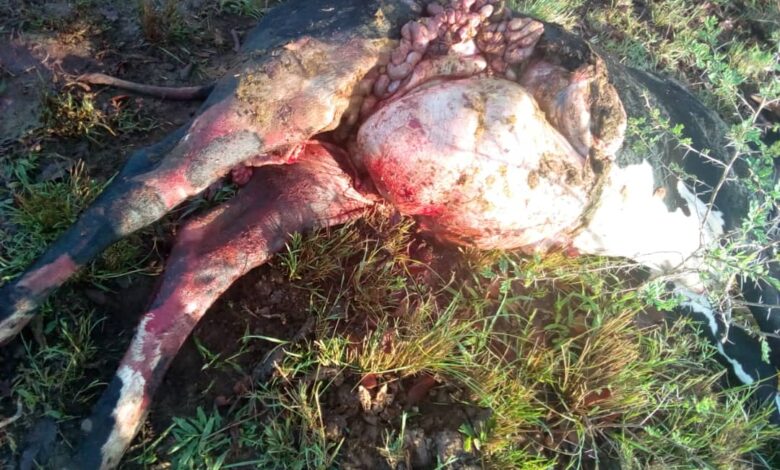Lyantonde residents in fear as wild beasts maul livestock

LYANTONDE- Locals in Lyantonde district are living in fear following the continuously killing of their livestock by wild animals thought to have escaped from the nearby Lake Mburo National Park.
According to the residents, the said wild monsters come in the night when people are asleep and kill mainly cattle and goats for food.
Ronald Bameka, the Lyantonde District Veterinary Officer (DVO), said the worrying incident happened on Saturday night when the wild beasts killed five goats, two cows, two heifers, and a bull in Kooki C Ward located in Lyantonde town council, before invading then Nyampongyerwa village and Kyewanula village in Lyantonde Sub County in Lyantonde district.
“They really traversed because some people are also giving us reports from Nshara Subcounty in Kiruhura district that they were also affected,” Bameka said.
He said the suspected hyenas and leopards left some of the fresh of killed animal scattered in the homes and grazing areas.
“They may be hyenas and leopards because the killed domestic animals were many. As long as these wild animals fail to hunt for what to feed on, they eventually escape from the national park and come to the farms where they are assured that livestock cannot run they just find animals in the kraal, kill and eat,” Bameka explained.
The DVO added that his office has been registering a number of cases from farmers reporting about the loss of livestock to wild attacks from the park.
“Over time I have been receiving complaints here about wild animals killing people’s livestock. And like in a year we lose about 50 goats and almost 20 cows,” he said.
He said Uganda Wildlife Authority (UWA) officials pledged a live fence along the park, but that this has not been done for the last 20 years.
“UWA promised that there is a project of putting an electric fence around Lake Mburo National Park but it’s now 20 years since I heard about that and nothing has been done,” he said.
The official asked UWA to compensate farmers who have lost cattle and goats to the park animals.
“These wild animals usually come out from the national park and avenge to the livestock therefore Uganda wild life authority should see how to compensate these people because their wild animals always come at night kill animals, eat and go back to the park,” he emphasised.
Bameka also appealed farmers to migrate from areas neighbouring the national park to avoid consistent attacks from the deadly animals from the park.
“Coordination with wildlife authority is important. We should have collaboration with the community and UWA so that the community should go away from areas near to the park,” he said.
Yosia Bagabo, the chairperson Kabula Farmers’ Cooperative Society Ltd located in Lyantonde said farmers living on tension are on the verge of losing all their animals thus calling government for serious attention.
“We are no longer sleeping because of fear for our animals which is our economic activity. Therefore we appeal to the government to quickly intervene,” Bagabo said.
Kabula Farmers’ Cooperative Society Ltd. which started in 2010 has over 800 registered farmers producing over 60,000 litres per day out of the 20 dairy cooperatives in Lyantonde.
Officials say Lyantonde district has about 200,000 head of cattle, 180,000 goats and 52,000 sheep.
On April 8, 2022, a joint operation involving the Uganda Police, the army and Uganda Wildlife Authority (UWA killed a stray juvenile lion after it killed a number of domestic animals including; goats, cattle, and pigs. The lion had been sighted by several people. The lion also injured some residents. Officials said then the lion escaped from Queen Elizabeth National Park.
Of recent, it appears there is a struggle to survive between the humans and beasts staying in Uganda’s national parks. Over a year ago, some residents living near Queen Elizabeth poisoned six lions. About 18 lions have been killed by humans in the last three years, even though conservation agencies say the number of lions killed since the year 2008 is 25.
https://thecooperator.news/atleast-200-animals-have-died-in-lyantonde-district/
Buy your copy of theCooperator magazine from one of our countrywide vending points or an e-copy on emag.thecooperator.news







